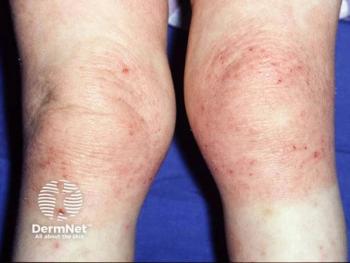
Symptoms and Severity of AD
Experts discuss the symptoms of atopic dermatitis (AD) and how disease severity may impact symptoms.
Episodes in this series

Transcript
Shawn Kwatra, MD: Let's go through to some of the symptoms and aspects of atopic dermatitis that patients might find most distressing. It's a little bit interesting when you classify by disease severity. Have you noticed similar or different complaints in folks who have mild to moderate disease vs folks who may have more severe disease?
Peter Lio, MD, FAAD: I definitely have a bias in my practice to more moderate/severe patients, so that's where I'm more experienced, but to some degree, the complaints are the same. It's just a matter of the severity of just how much of an imposition it is on their life, but it really does seem like those common characteristics of poor sleep and interference with predictability in your life, and of course, likethe itching, all of those are there. For the mildest patients, it might be just once in a while, and it might be a nuisance; they can kind of mind and body their way through and just try not to scratch. We know as it gets more significant, it's really impossible to do that. Even if you are very, very disciplined and are not physically scratching or rubbing, the itch can be terrible and relentless. Many patients use that word, [and say] 'it's unrelenting itch' and it has this gigantic impact.
Shawn Kwatra, MD: Do you think that folks underplay how severe the ‘itch’ is?
Peter Lio, MD, FAAD: I do, and I will tell you a story about something that I've learned recently, just in the last couple of years. I've become kind of obsessed with this validated tool for measuring atopic dermatitis control, called the Atopic Dermatitis Control Tool, or ADCT. It's relatively new, but it's very similar to the POEM score, since it is like 1 question less and it's very comparable. I love it because you can ask it in just about 45 seconds, so it sort of gives me an objective way to kind of pin things down that I honestly think is much more comprehensive than just doing an easy score, or an IGA [Investigator’s Global Assessment], where you're just looking at what's there on that day because each question of the ADCT starts with 'over the past week'. I love that you get a little bit more temporality and then you capture things like sleep and quality of life. One of the crazy things that happened though, is that we'll start a visit, and I'll say “How you've been? What's been happening?” And the patient will say, “You know, I'm pretty good, I think I'm doing pretty well.” Then, I'll go through those 6 questions and literally less than a minute later, the patient is crying. I'll say, “What's the matter?” They say, “I don't think I am in good control; I think it's pretty terrible.” To your point, a lot of patients have become inured to their disease and inured to their itch. They're so used to it that it is the new norm and when you actually tease it out and ask about it, then they realize “Oh, my goodness, this is not normal that I am itchy and uncomfortable.” In a way, I say, “Listen, it just tells me you're really tough. You're not a complainer. You're pushing through despite being really miserable, but this is not enough. I want you to be to the point where you are not feeling this terrible itch all of the time.”
Shawn Kwatra, MD: Absolutely. I'm totally with you. We recently did a study where we looked at the impact of folks who have chronic itch from all different causes including eczema, and the actual impact on the overall quality of life is as severe as having a stroke or having congestive heart failure, or incredibly uncontrolled diabetes. That's the real landscape that chronic itch and atopic dermatitis falls in. Even as a doctor, I treat eczema and itchy patients just like you. Actually, some of my colleagues in the house of medicine don't take me seriously. They think, “Oh, that's what you treat?” and they don't actually appreciate how severe the disease is. What I worry about for my patients is that other people in their lives may not have that degree of empathy and compassion that they should have and that leads to guilt, shame, and suffering, which I see it a lot. It's pretty sad to me that that happens sometimes. It's a very severe situation. I had my sister-in-law, she recently had intense uncontrolled outbursts of eczema, and one thing she told me is, “I think having itch to this degree is worse than any pain I could ever imagine.” If you think about it, like in Dante's Inferno, which talks about the rings of hell, one of the rings of hell is being in the state where you have chronic itch. In India, there's a village where they punish folks by being in a triangular cage where they're exposed to an itch causing substance. What they found is that 1 day of being exposed to that itch-causing substance is more of a deterrent than 10 years in prison.
Peter Lio, MD, FAAD: My goodness, that's incredible. It makes sense, right? It is something terrible and it has a huge impact on people. I love Dante’s Inferno; What an incredible way to think about this problem.
Shawn Kwatra, MD: Incredible. We are talking about something that is very important that impacts lives. I want everybody watching to realize how important this is.
Transcript edited for clarity.
Newsletter
Like what you’re reading? Subscribe to Dermatology Times for weekly updates on therapies, innovations, and real-world practice tips.




















